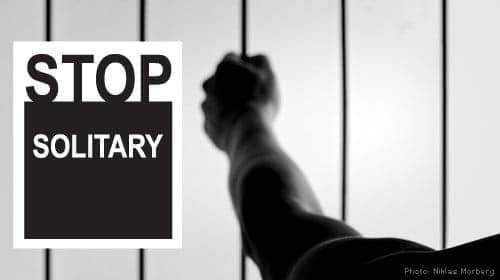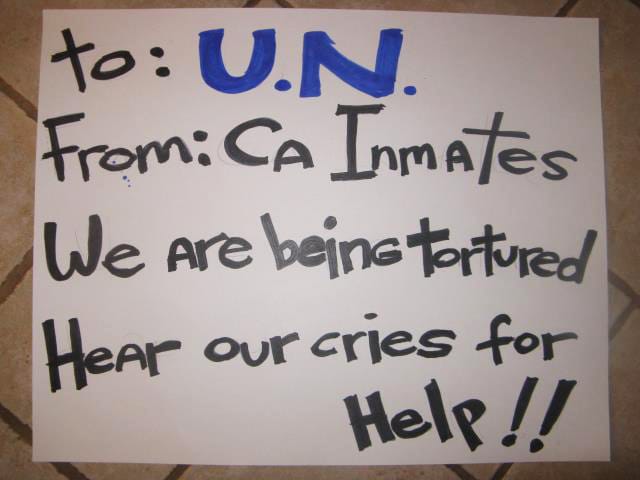The following open letter was sent Aug. 16, 2013, marked “URGENT.”
 Juan E. Mendez
Juan E. Mendez
U.N. Special Rapporteur on Torture and Other Cruel, Inhuman or Degrading Treatment or Punishment
c/o Office of the High Commissioner for Human Rights
United Nations Office at Geneva
CH-1211 Geneva 10, Switzerland
Washington College of Law
4801 Massachusetts Ave., NW
Washington, DC 20016
Dear Rapporteur Mendez:
I am writing on behalf of the over 300 California prisoners in solitary confinement under the jurisdiction of the California Department of Corrections and Rehabilitation (CDCR) and the 14 concerned organizations that joined the Petition submitted to you on March 20, 2012, regarding the conditions of torture and inhumane treatment being endured by thousands of California prisoners in solitary confinement for indeterminate periods of time (often several decades) based solely on their alleged gang membership or association (Petition). On Feb. 24, 2013, we sent you a communication discussing the ongoing harm being suffered by the Petitioners.
 On July 8, 2013, thousands of prisoners in solitary confinement in California began a peaceful hunger strike to protest the torturous treatment they are experiencing. During the first week of the action, at least 14 prisoners considered “leaders” of the hunger strike were subjected to further isolated confinement and punishment, including at PBSP cancellation of family visits. Families and advocates have generally received no information about the medical condition of their loved ones other than through media reports describing the slow deterioration of the inmates. Given that all of their rights have been stripped, about the only remedy these prisoners have is the one they have chosen, to refuse to eat.
On July 8, 2013, thousands of prisoners in solitary confinement in California began a peaceful hunger strike to protest the torturous treatment they are experiencing. During the first week of the action, at least 14 prisoners considered “leaders” of the hunger strike were subjected to further isolated confinement and punishment, including at PBSP cancellation of family visits. Families and advocates have generally received no information about the medical condition of their loved ones other than through media reports describing the slow deterioration of the inmates. Given that all of their rights have been stripped, about the only remedy these prisoners have is the one they have chosen, to refuse to eat.
Efforts over the past month to discuss or mediate the prisoner’s concerns with the CDCR have not resulted in any changes in policy and we are therefore now writing to request that you urgently consider conducting an on-site visit to one or more California prisons, including Pelican Bay State Prison (PBSP) to interview prisoners (now on the 38th day of their hunger strike) and prison officials.
On July 8, 2013, thousands of prisoners in solitary confinement in California began a peaceful hunger strike to protest the torturous treatment they are experiencing. During the first week of the action, at least 14 prisoners considered “leaders” of the hunger strike were subjected to further isolated confinement and punishment, including at PBSP cancellation of family visits.
The situation is extremely grave as the physical and mental health of the prisoners is deteriorating rapidly. On July 22, 2013, a prisoner on the hunger strike died, though details regarding the circumstances surrounding his death have not been made public by CDCR.
 As discussed in detail in the Petition, the extraordinarily large population of prisoners in segregation is a result of California’s policy to place prisoners in solitary confinement for mere alleged gang membership or association without the need to show any wrongdoing or threatened wrongdoing. Prisoners remain in solitary confinement until they can prove they have been “gang free” for six years, or agree to become an active “informant,” a dangerous option very few prisoners are willing to take.
As discussed in detail in the Petition, the extraordinarily large population of prisoners in segregation is a result of California’s policy to place prisoners in solitary confinement for mere alleged gang membership or association without the need to show any wrongdoing or threatened wrongdoing. Prisoners remain in solitary confinement until they can prove they have been “gang free” for six years, or agree to become an active “informant,” a dangerous option very few prisoners are willing to take.
California is believed to hold nearly 12,000 prisoners in isolation. Many of its policies, training materials and assessments are secret and several hundred prisoners have joined a request for disclosure under the California Public Records Act which the CDCR has failed to answer. Prisoners intend to seek judicial review of CDCR’s refusal to make its policies and practices on solitary confinement more transparent.
At PBSP, about half the population of prisoners is in solitary confinement. They are locked in their cells for about 23 hours a day. More than 400 prisoners have been held in solitary at PBSP for over a decade, and the average time a prisoner spends in solitary segregation is 7.5 years.
The striking prisoners have made public five core demands:
- Comply with the recommendations of the U.S. Commission on Safety and Abuse in America’s Prisons and end long-term solitary confinement.
- Abolish the debriefing (informant) policy and modify active/inactive gang status criteria.
- Eliminate group punishments and administrative abuse.
- Provide adequate and nutritious food.
- Create and expand constructive programming.
As the Petition explains in detail, the conditions in which these prisoners are detained are horrific and have caused and continue to cause severe and often irreparable physical and mental harm. See Petition at pages 3-29, 43-47.
The situation is extremely grave as the physical and mental health of the prisoners is deteriorating rapidly.
Most current prisoners who have been locked in isolated segregation for 10 to 35 years have never been found guilty of committing a gang-related illegal act, or engaging in any other illegal conduct during their incarceration. See Petition at pages 36-43.
The brutal conditions described in the Petition remain in effect throughout the period since the Petition was submitted to you. There have been no material changes in California policy towards prisoners placed in solitary segregation. The Petitioners continue to be locked in small concrete cells on average 23 hours a day, have no telephone privileges, very restricted family visits, no contact visits, unhealthy and inadequate food, no access to a fair process to assess the reasons for being placed in isolated segregation, inadequate mental health and medical services, sleep deprivation, and numerous other dehumanizing conditions. We are also gravely concerned about recent reports that prison guards are retaliating against hunger strikers by blasting cells with cold air, restricting family visits, confiscating legal documents and, in at least one case, banning lawyers, according to legal representatives and relatives.
 The Petition explains in detail why the treatment of the petitioning prisoners amounts to torture or degrading treatment illegal under well-established international norms and obligations of the United States and the state of California including, inter alia, customary international law, the United Nations Convention Against Torture and Other Cruel, Inhumane or Degrading Treatment or Punishment (CAT), and the International Covenant on Civil and Political Rights (ICCPR). See Petition at pages 47-58.
The Petition explains in detail why the treatment of the petitioning prisoners amounts to torture or degrading treatment illegal under well-established international norms and obligations of the United States and the state of California including, inter alia, customary international law, the United Nations Convention Against Torture and Other Cruel, Inhumane or Degrading Treatment or Punishment (CAT), and the International Covenant on Civil and Political Rights (ICCPR). See Petition at pages 47-58.
We respectfully and urgently request that you consider promptly visiting the solitary confinement prisoners and prison authorities, at minimum at PBSP, and thereafter issue such guidance as may be helpful to bring an end to the violations of the CAT and ICCPR now occurring. In the event an on-site visit can only be scheduled if the petitioning parties pay for necessary travel expenses, we are fully prepared to do so. If an on-site visit requires approval by U.S. authorities and we can be of any assistance urging such approval, we of course are willing to do so given the urgency of the situation.
We respectfully and urgently request that you consider promptly visiting the solitary confinement prisoners and prison authorities, at minimum at PBSP, and thereafter issue such guidance as may be helpful to bring an end to the violations of the CAT and ICCPR now occurring.
Please feel free to contact me in the event you have any questions or require additional information. Thank you for your consideration. I look forward to your response.
Very Truly Yours,
Peter A. Schey
President and Executive Director
Center for Human Rights and Constitutional Law
256 S. Occidental Boulevard
Los Angeles, CA 90057
Peter Schey can be reached at pschey@centerforhumanrights.org.
The post Urgent request to UN Special Rapporteur on Torture Juan Mendez to visit California hunger strikers appeared first on San Francisco Bay View.